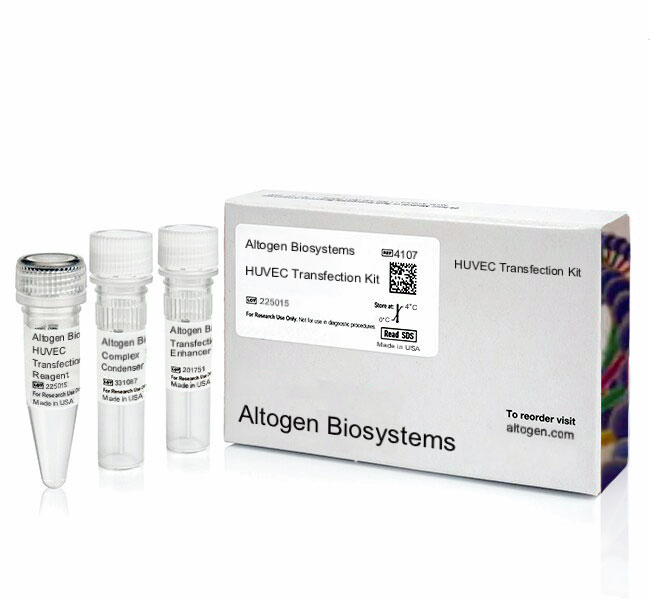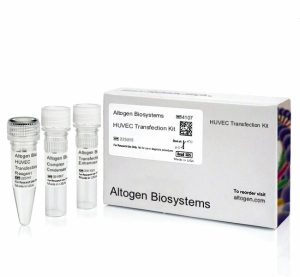Description
Purchase Orders: Click “Add to Cart” button to order, then email PO to orders@altogen.com.
Product Availability: In Stock.
Transfection Reagent for HUVEC Cells (Human Umbilical Vein Endothelial Cells)
- Proprietary cationic lipids formulation
-
High transfection efficiency of small RNA (siRNA, shRNA, miRNA), mRNA, pDNA
-
Effective and robust intracellular delivery
-
Kit includes Complex Condenser and Transfection Enhancer reagents
-
Work in the presence of serum
-
A proven reagent for establishing stable HUVEC cell lines
-
Download HUVEC transfection protocol: [PDF]
- Download HUVEC CRISPR/Cas9 transfection protocol: [PDF]
- Download PowerPoint presentation for HUVEC cells transfection kit: [PPT]
- UPC/GTIN/EAN: 860002089777
-
Brand: ALTOGEN®, developed and manufactured by Altogen Biosystems
Transfection Efficiency:
Reagent exhibits at least 80% transfection efficiency of siRNA delivery. Transfection efficiency was determined by qRT-PCR.
Product Description:
Transfection kit for HUVEC cells, human umbilical vein endothelial cell line. Transfection reagent supplemented by complex condenser and transfection enhancer.
Transfection Protocol and SDS:
Download Altogen Biosystems HUVEC Transfection Protocol: [PDF]
Download SDS: [PDF]
HUVEC Cell Line:
The Human Umbilical Vein Endothelial Cell line (HUVEC) is a powerful tool in the study of various physiological processes such as angiogenesis. The HUVEC cell line was derived and established from human umbilical vein endothelial cells, which is also where it gets its name. This cell line very useful in the study of the interior of the umbilical cord. It is believed that HUVEC cells may play a role in angiogenesis, the formation of blood vessels from pre-existing vessels, which supply cancer growths with nutrients. Multiple research groups work on the development of cancer medicines by targeting angiogenesis. Angiogenesis is the growth of new blood vessels that is naturally used for healing and reproduction. The body controls angiogenesis by secreting chemical signals that can stimulate the formation of new blood vessels as well as the repair of damaged ones. Excessive or insufficient blood vessel growth may cause balance disturbance in the body, resulting in various deadly and debilitating diseases, such as cancer, cardiovascular disease, diabetic ulcers, and many others. Angiogenesis inhibitors usually interfere with blood vessel formation.
Endothelial cells play a key role in a diverse range of physiological processes and pathophysiological processes, including arterial disease and cancer development. HUVEC systems are commonly used for physiological and pharmacological investigations, such as macromolecule transport, fibrinolysis, and blood coagulation. HUVEC are responsive to cytokine stimulation in the expression of cell adhesion molecule. Altogen Biosystems provides an advanced formulation of a lipid-based HUVEC transfection reagent kit for umbilical vein endothelial cells.
In addition to their role in angiogenesis research, HUVEC cells are used in a variety of other applications, including toxicology testing, drug screening, and the development of tissue engineering and regenerative medicine approaches. They are also used as a tool to study other aspects of endothelial cell biology, such as cell migration, adhesion, and signal transduction.
Data:
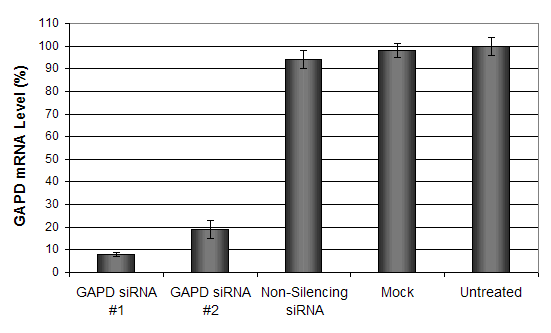
Figure 1. GAPD mRNA levels were quantified using real-time RT-PCR in the HUVEC cells transfected with siRNAs targeting GAPD or non-silencing siRNA. Forty-eight hours post-transfection, the cells were harvested and analyzed by real-time RT-PCR for GAPDH mRNA expression levels. Data were normalized against the 18S rRNA signal. Control samples were either mock-transfected or untreated. Values are normalized to untreated sample. Data are means ± SD (n=3).
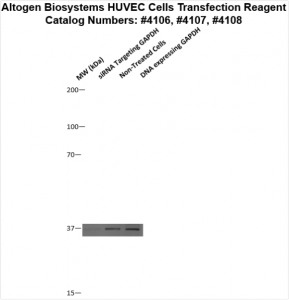
Figure 2. Protein expression of GAPDH in HUVEC cells. DNA plasmid expressing GAPDH or siRNA targeting GAPDH were transfected into HUVEC cells following Altogen Biosystems transfection protocol. At 72 hours post-transfection the cells were analyzed by Western Blot for protein expression levels (normalized by total protein, 10 µg of total protein loaded per each well). Untreated cells used as a negative control.
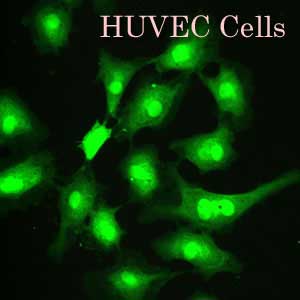
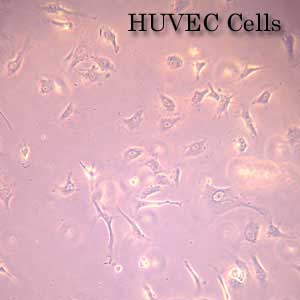
Selected in vivo transfection product citations (ALTOGEN® IN VIVO Transfection Kits used in the following publications):
- Nature. 2008 454(7203):523-7. Innate immunity induced by composition-dependent RIG-I …Saito et al [PDF]
- Am J Pathology. 2010 177(4):1870-80. Role of ocular complement factor H in a murine model … Lyzogubov et al [PDF]
- Nature Biotechnology. 2011 29(4):341-5. Delivery of siRNA to the mouse brain by … Alvarez-Erviti et al [PDF]
- Cancer Research. 2011 71(15):5144-53. Inhibition of miR-193a expression by… Iliopoulos et al [PDF]
- RNA. 2010 16(11):2108-19. RNase L releases a small RNA from HCV RNA that refolds … Malathi et al [PDF]
- Diabetologia. 2012 55(7):2069-79. The p47phox- and NADPH oxidase organiser 1 … Youn et al [PDF]
- British Journal of Cancer. 2012 107(3):516-26. TIGAR induces p53-mediated cell-cycle … Madan et al [PDF]
- Hypertension. 2014 63(2):353-61. Tissue transglutaminase contributes to … Liu et al [PDF]
- Circulation Research. 2010 15;107(8). Kruppel-like factor-4 transcriptionally regulates … Cowan et al [PDF]
- Hypertension. 2012 59(1):158-66. Role of uncoupled endothelial nitric oxide synthase … Gao et al [PDF]
- Jounal of Biological Chemistry. 2012 287(4):2907. Chaperoning of mutant p53 protein … Gogna et al [PDF]
- PLoS Pathogens. 2012 8(8) Uridine composition of the poly-U/UC tract of HCV RNA … Schnell et al [PDF]
- J Proteome Res. 2012(11) Retinal proteome analysis in a mouse model of oxygen-induced … Kim et al [PDF]
Altogen Biosystems is a life sciences company that offers cell type-specific and pre-optimized transfection products, elecroporation kits, and in vivo delivery reagents. Advanced formulation of reagents and optimized transfection protocols provide efficient intracellular delivery of protein, DNA, mRNA, shRNA and siRNA molecules. Read more about transfection technology at Altogen’s Transfection Resource. Altogen Labs provides safety and efficacy preclinical research services. GLP-compliant studies for IND applications, and drug development, including over 90 in-house validated xenograft models, safety toxicology, etc (visit AltogenLabs.com).
Volume Options:
- 0.5 ml (Catalog #4106)
- 1.5 ml (Catalog #4107)
- 1.5 ml CRISPR (Catalog #2159)
- 8.0 ml (Catalog #4108)
Purchase Orders: Click “Add to Cart” button to order, then email PO to orders@altogen.com.
Product Availability: In Stock.





